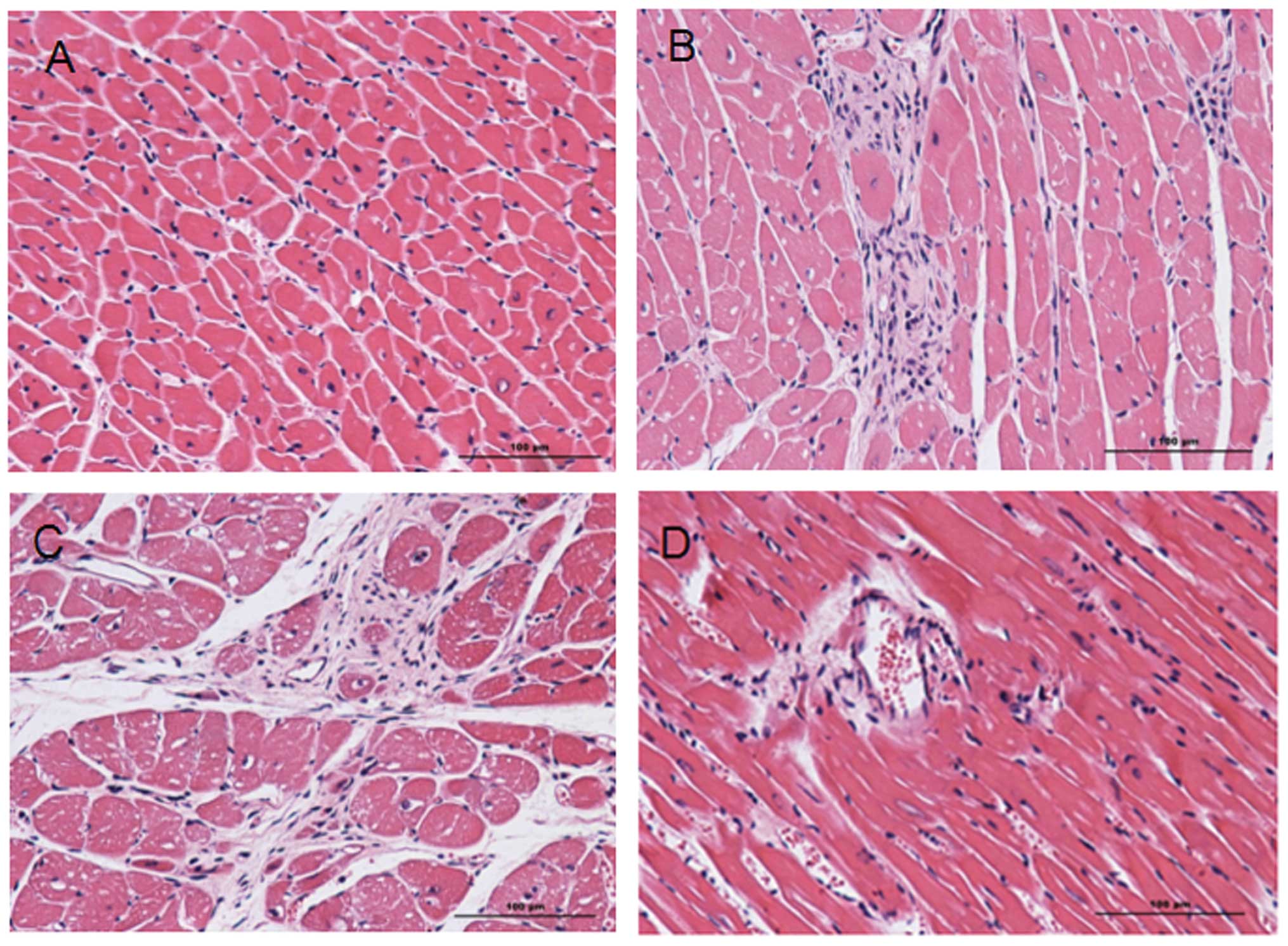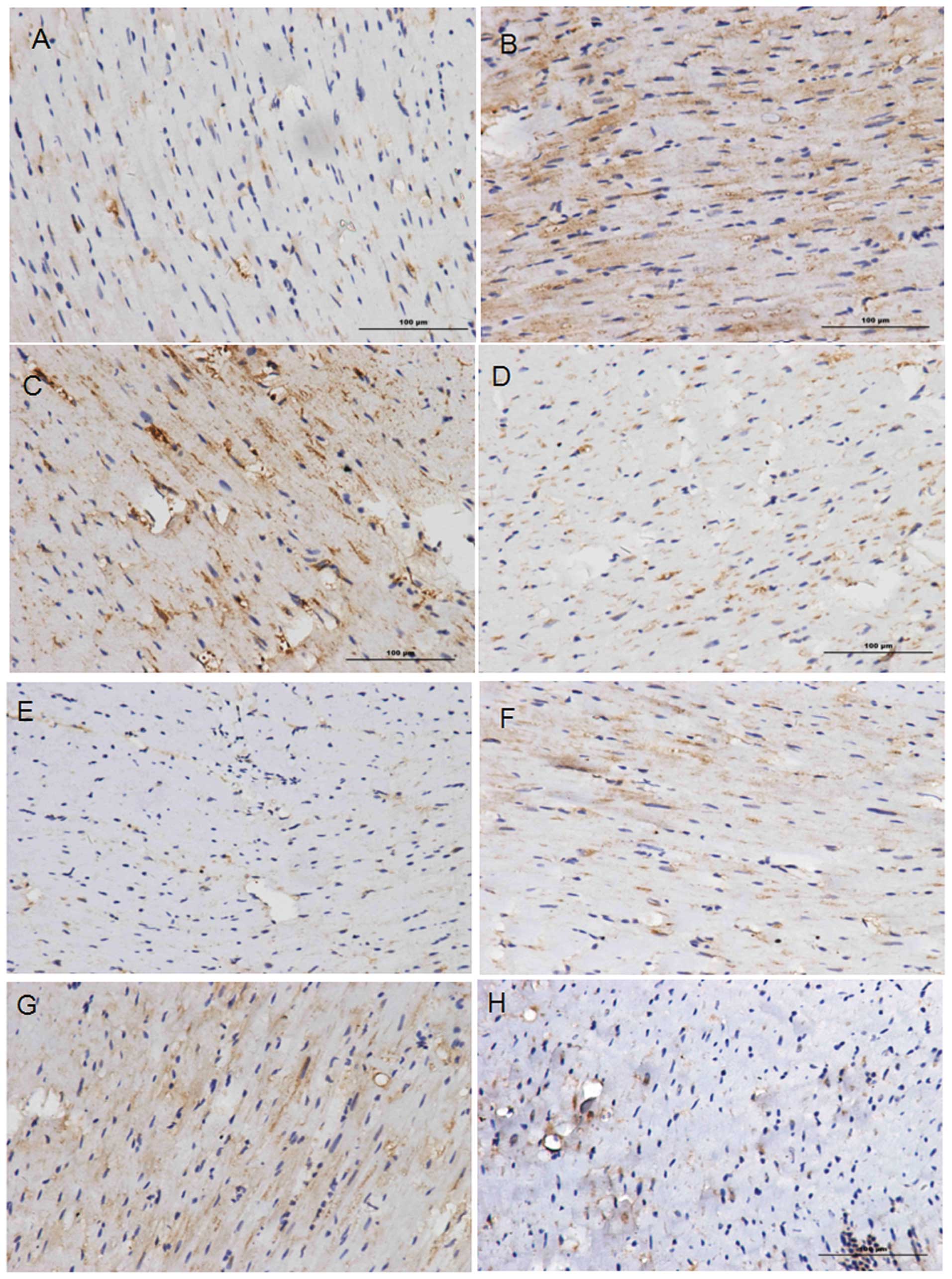|
1
|
Carden DL and Granger DN: Pathophysiology
of ischaemia-reperfusion injury. J Pathol. 190:255–266. 2000.
View Article : Google Scholar : PubMed/NCBI
|
|
2
|
Zhang W, Han Y, Meng G, Bai W, et al:
Direct renin inhibition with aliskiren protects against myocardial
ischemia/reperfusion injury by activating nitric oxide synthase
signaling in spontaneously hypertensive rats. J Am Heart Assoc.
3:e0006062014. View Article : Google Scholar : PubMed/NCBI
|
|
3
|
Jeong M, Cho J, Shin JI, et al: Hempseed
oil induces reactive oxygen species- and C/EBP homologous
protein-mediated apoptosis in MH7A human rheumatoid arthritis
fibroblast-like synovial cells. J Ethnopharmacol. 154:745–752.
2014. View Article : Google Scholar : PubMed/NCBI
|
|
4
|
Campos G, Schmidt-Heck W, Ghallab A, et
al: The transcription factor CHOP, a central component of the
transcriptional regulatory network induced upon CCl4
intoxication in mouse liver, is not a critical mediator of
hepatotoxicity. Arch Toxicol. 88:1267–1280. 2014. View Article : Google Scholar : PubMed/NCBI
|
|
5
|
Pavli M, Farmaki E, Merkourea S, et al:
Endoplasmic reticulum stress-associated chaperones, Bip/GRP78 and
calnexin are overexpressed in keratocystic odontogenic tumours. J
Oral Maxillofac Res. 5:e32014.PubMed/NCBI
|
|
6
|
Feng YX, Sokol ES, Del Vecchio CA, et al:
Epithelial-to-mesenchymal transition activates PERK-eIF2a and
sensitizes cells to endoplasmic reticulum stress. Cancer Discov.
4:702–715. 2014. View Article : Google Scholar : PubMed/NCBI
|
|
7
|
Jerry Chiang WC and Lin JH: The effects of
IRE1, ATF6, and PERK signaling on adRP-linked rhodopsins. Adv Exp
Med Biol. 801:661–667. 2014. View Article : Google Scholar : PubMed/NCBI
|
|
8
|
Karali E, Bellou S, Stellas D, et al: VEGF
signals through ATF6 and PERK to promote endothelial cell survival
and angiogenesis in the absence of ER stress. Mol Cell. 54:559–572.
2014. View Article : Google Scholar : PubMed/NCBI
|
|
9
|
Ozpolat B, Akar U, Tekedereli I, Alpay SN,
et al: PKCδ regulates translation initiation through PKR and eIF2α
in response to retinoic acid in acute myeloid leukemia cells. Leuk
Res Treatment. 2012:4829052012.
|
|
10
|
Bruhat A, Chérasse Y, Maurin AC, et al:
ATF2 is required for amino acid-regulated transcription by
orchestrating specific histone acetylation. Nucleic Acids Res.
35:1312–1321. 2007. View Article : Google Scholar : PubMed/NCBI
|
|
11
|
Bruhat A, Jousse C, Carraro V, Reimold AM,
Ferrara M and Fafournoux P: Amino acids control mammalian gene
transcription: activating transcription factor 2 is essential for
the amino acid responsiveness of the CHOP promoter. Mol Cell Biol.
20:7192–7204. 2000. View Article : Google Scholar : PubMed/NCBI
|
|
12
|
Nakajima S, Hiramatsu N, Hayakawa K, Saito
Y, Kato H, Huang T, Yao J, Paton AW, Paton JC and Kitamura M:
Selective abrogation of BiP/GRP78 blunts activation of NF-κB
through the ATF6 branch of the UPR: involvement of C/EBPβ and
mTOR-dependent dephosphorylation of Akt. Mol Cell Biol.
31:1710–1718. 2011. View Article : Google Scholar : PubMed/NCBI
|
|
13
|
Moens AL, Claeys MJ, Timmermans JP and
Vrints CJ: Myocardial ischemia/reperfusion-injury, a clinical view
on a complex pathophysiological process. Int J Cardiol.
100:179–190. 2005. View Article : Google Scholar : PubMed/NCBI
|
|
14
|
Mayer P: Hematoxylin and eosin (H&E)
staining protocol. Mitt Zool Stn Neapel. 12:3031896.
|
|
15
|
Ramos-Vara JA: Technical aspects of
immunohistochemistry. Vet Pathol. 42:405–426. 2005. View Article : Google Scholar : PubMed/NCBI
|
|
16
|
Mouw G, Zechel JL, Gamboa J, Lust WD,
Selman WR and Ratcheson RA: Activation of caspase-12, an
endoplasmic reticulum resident caspase, after permanent focal
ischemia in rat. Neuroreport. 14:183–186. 2003. View Article : Google Scholar : PubMed/NCBI
|
|
17
|
Hausenloy DJ and Yellon DM: Myocardial
ischemia-reperfusion injury: a neglected therapeutic target. J Clin
Invest. 123:92–100. 2013. View
Article : Google Scholar : PubMed/NCBI
|
|
18
|
Braunwald E and Kloner RA: Myocardial
reperfusion: a double-edged sword? J Clin Invest. 76:1713–1719.
1985. View Article : Google Scholar : PubMed/NCBI
|
|
19
|
Piper HM, García-Dorado D and Ovize M: A
fresh look at reperfusion injury. Cardiovasc Res. 38:291–300. 1998.
View Article : Google Scholar : PubMed/NCBI
|
|
20
|
Yellon DM and Hausenloy DJ: Myocardial
reperfusion injury. N Engl J Med. 357:1121–1135. 2007. View Article : Google Scholar : PubMed/NCBI
|
|
21
|
Xie LD, Chen DG, Zhang S, Wang HJ and Chen
HJ: Sympatholytic effect of captopril in regression of
cardiovascular remodeling in spontaneously hypertensive rats.
Zhongguo Yao Li Xue Bao. 15:123–128. 1994.PubMed/NCBI
|

















